Ten years after 9/11 the U.S. and Middle East allies weaponized jihadist groups in Syria, writes Andrew Hammond, and the result was an utter disaster. But don’t expect any self-reflection from the cheerleaders.
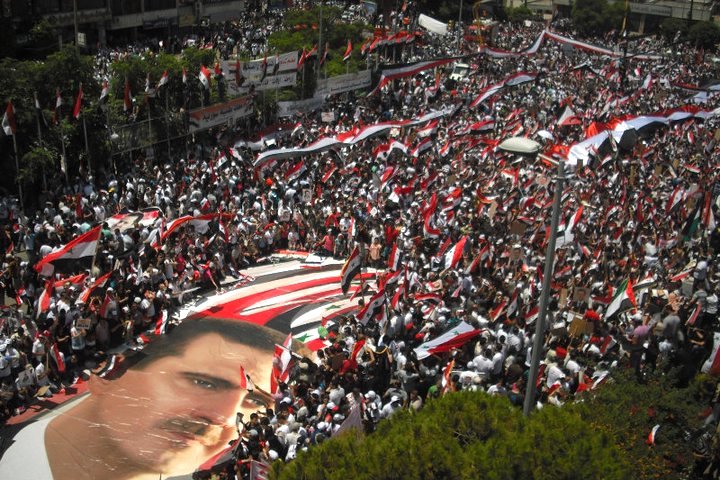
June 20, 2011: Pro-Assad demonstration in Latakia, Syria. (Sammy.aw, CC BY 3.0, Wikimedia Commons)
By Andrew Hammond
in Oxford, England
Special to Consortium News
 The recent rush of news reports about Balkan, Middle East and East European states scrambling to reestablish ties with Damascus would appear to signal the effective collapse of the decade-long Western policy of war, sanctions and isolation to end the rule of Bashar al-Assad’s Baath regime in Syria.
The recent rush of news reports about Balkan, Middle East and East European states scrambling to reestablish ties with Damascus would appear to signal the effective collapse of the decade-long Western policy of war, sanctions and isolation to end the rule of Bashar al-Assad’s Baath regime in Syria.
Syria’s southern neighbor Jordan opened its land border to trade in September as a precursor to a gas pipeline project that will run through its territory from Egypt to Lebanon. King Abdullah even took a phone call from Assad, much to the chagrin of the pundits on Syria whose opinions have formed the background music to American policy since the conflict began.
The Egyptian and Syrian foreign ministers held talks at the U.N. General Assembly in New York, Algeria wants Syria to attend the next Arab summit and the UAE made a point of inviting Syria to take part in its World Expo that opened in October.
Worried about refugees more than trade, Serbia, Cyprus and Greece have normalized relations over the past year and Hungary intends to follow. Seeking to maximize its access to the Mediterranean, China welcomed Syria formally in its Belt and Road Initiative this month, though what that means in real terms at this stage is far from clear.
Even Saudi Arabia, which suddenly metamorphosed into Assad’s arch enemy at U.S. behest in mid-2011, is reaching out.
The most striking element of this is that the Arab states, which care most about what the United States government thinks, appear to have the tacit approval of the Biden administration. Jordan obtained explicit U.S. assurances of no repercussions for pursuing the gas deal after arguing vociferously for a new approach to Syria, and the Biden administration has responded with signals that it will relax efforts to stop countries reconnecting with Syria.
Yet when pressed on the issue publicly Secretary of State Antony Blinken reiterated that the U.S. position is to “oppose the reconstruction of Syria” in the absence of a political solution.
The Pentagon still maintains troops at Syrian, desert oilfields and a base on the Baghdad-Damascus highway for reasons apparently related to Israeli security and preventing transit of weapons from Iran to Hizbullah in Lebanon.
And in 2020 the U.S. Congress imposed the Caesar Act sanctions targeting Assad, his family, senior officials and institutions such as the central bank, adding Syrians to the list of populations around the world whose lives have been immiserated by the U.S. government’s penchant for abusing the dollar’s status as the global reserve currency.
In other words, U.S. policy remains wrapped in contradiction.
Catastrophic Conflict
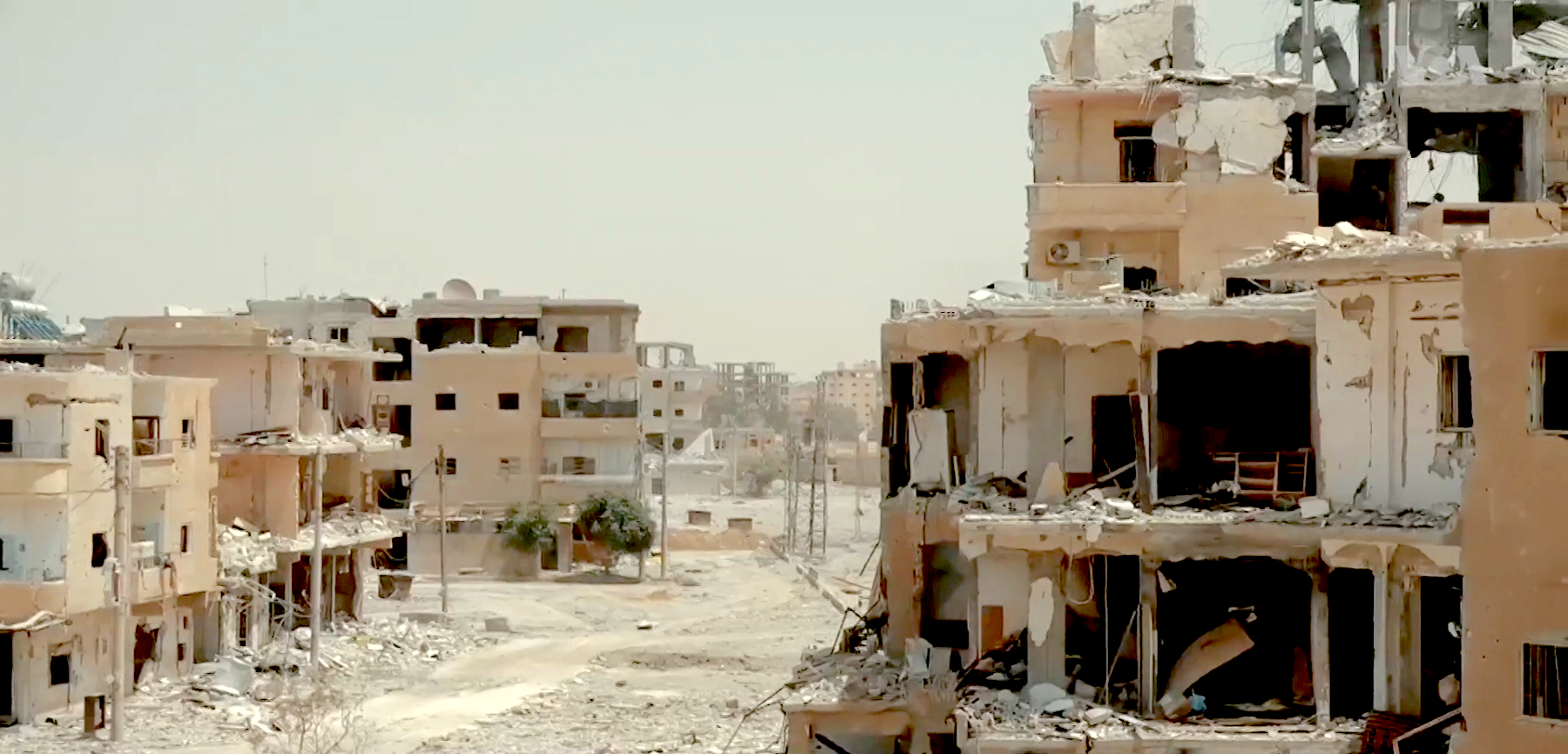
Much of Raqqa, Syria, suffered extensive damage during the battle of June–October 2017. (Mahmoud Bali, Voice of America, Wikimedia Commons)
Now, by any standard the Syrian war has been an unmitigated disaster. The United Nations’ human rights office estimates at least 350,000 people have been killed, while the opposition Syrian Observatory for Human Rights puts the figure at 616,000, including civilians, combatants and the array of regular and irregular international forces that joined the fight.
Of a prewar population of around 22 million people, the U.N. refugee agency says around 6.7 million have been displaced internally, while 6.6 million fled the country, mainly to Turkey, Lebanon, Jordan, Iraq and Egypt.
Chilling images of urban devastation in Homs, Kobani and Aleppo where fighting was intense were emerging by 2013. Reports of the horrendous treatment of detainees began as early as April 2011 and only got worse.
Then following a year of impromptu Western warnings over use of chemical weapons the first documented incident took place in Ghouta near Damascus in August 2013, yet failed to trigger the widely expected U.S.-led military response because Western politicians balked at overt intervention.
By that stage the conflict had become a U.S.-led proxy war of intervention through covert operations organized by the C.I.A. out of Jordan and Turkey to funnel arms and international fighters into Syria under the codename Timber Sycamore.
Recreating the distribution of roles during the Afghanistan war against the Soviets in the 1980s, Saudi Arabia heavily funded the project to weaponize Islamic jihadist ideology against a regime branded as apostate and infidel in supportive Arab media.
Despite whatever safeguards were put in place, this opened the floodgates to some 50,000 foreign fighters entering Syria, some of them joining al-Qa’ida’s Nusra Front (considered by the State Department to be an ally) but most flowing towards the growing Islamic State group (aka ISIS) which in June 2014 declared its own state entity (“caliphate”) in territory straddling north Iraq and north Syria.
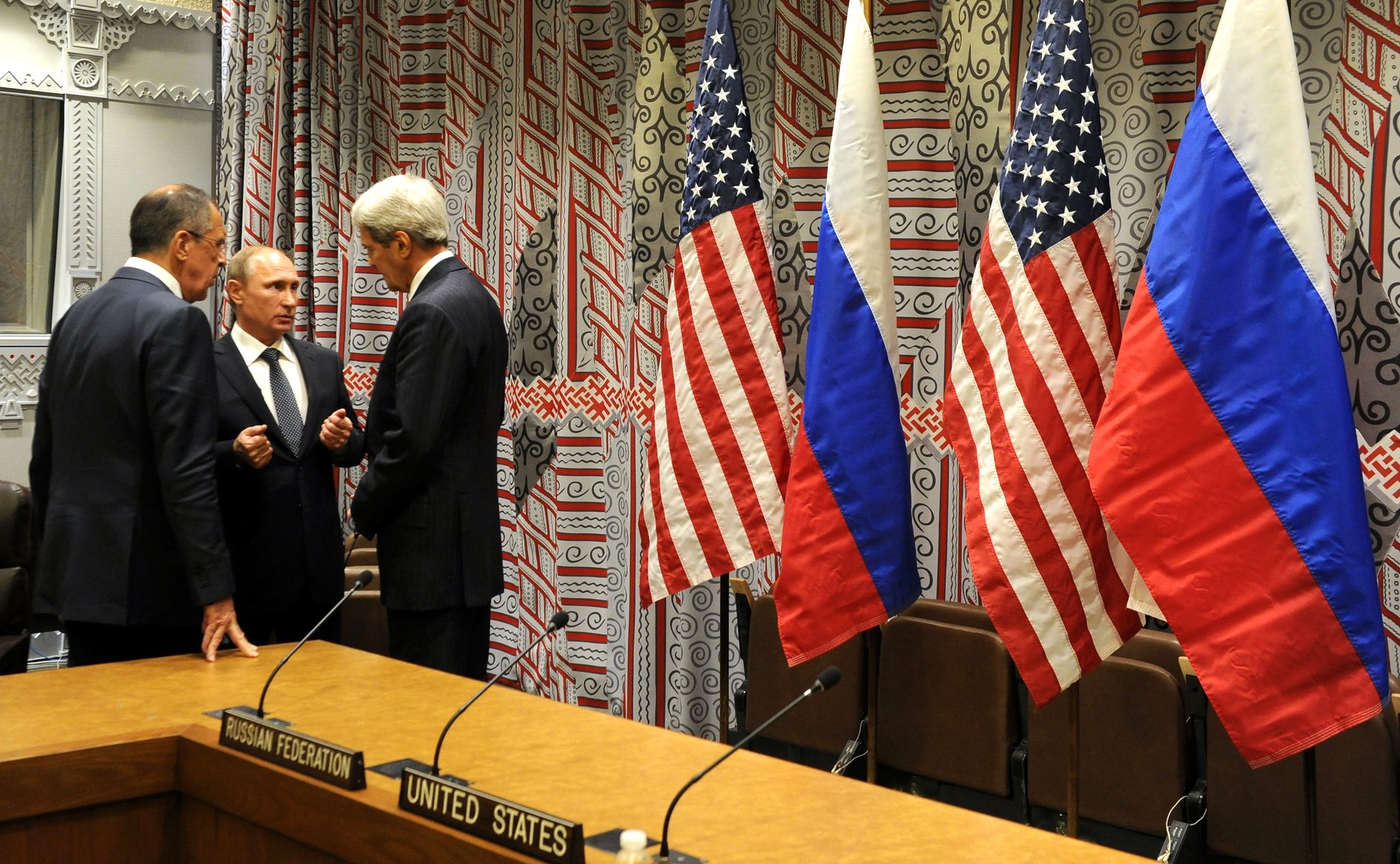
Sept. 29, 2015: From left: Russian Foreign Minister Sergei Lavrov, President Vladimir Putin and U.S. Secretary of State John Kerry discussing the situation in Syria. (Kremlin.ru, CC BY 4.0, Wikimedia Commons)
But the romance of Hemingway’s Spanish Civil War this was not. Moved by the on-camera murder of Western hostages and mass suicide, bombings and other attacks in Western countries, the participating Western governments had no choice but to shift their priorities away from the task of toppling Assad to destroying the ISIS statelet via their military arm NATO — finally achieved in 2017.
The Obama administration had at earlier stage left ISIS to expand in the hope of pressuring Damascus into concessions, but Russia’s intervention against ISIS in 2015 proved decisive in saving the Assad regime, which then began to win back lost territories. During his presidency Donald Trump finally ordered the C.I.A. to drop its work with what mainstream discourse called “moderate rebels.” So chaotic had the failed American strategy become that at one point reports even emerged of different C.I.A. and Pentagon-funded jihadist groups turning on each other.
Turkey also suffered unintended political and economic consequences from its role in fueling the war, as ISIS took revenge for its NATO cooperation with a series of mass attacks from 2015 to 2017 that dented the economy. Syrian Kurds managed to carve out a large autonomous zone on Turkey’s border, forcing Ankara too to shift priorities away from removing the Syrian regime to crushing the Kurdish experiment.
For the Uyghurs of Xinjiang province in China the cost was even higher. Following an intensified campaign of bombings and suicide attacks by Turkistan Islamic Party separatists emboldened by Uyghur experience of the Syrian jihad, China launched a draconian campaign of mass internment in 2017 that is only now winding down.
Yet for the Arab Gulf states the Syrian intervention was no more than a minor domestic inconvenience. ISIS launched a limited campaign in Saudi Arabia that was far easier for the government to handle than the Al-Qaeda insurgency that erupted following the U.S.-British invasion of Iraq, while Qatar — another key player in the proxy war — paid no domestic price at all, highlighting the continued ability of the petrodollar monarchs to engage in jihadist wars of no consequence. They have no concern for elections such as those that saw the Spanish government that supported the Iraq war voted out of office following the Madrid train bombings of March 2004.
War Pundits
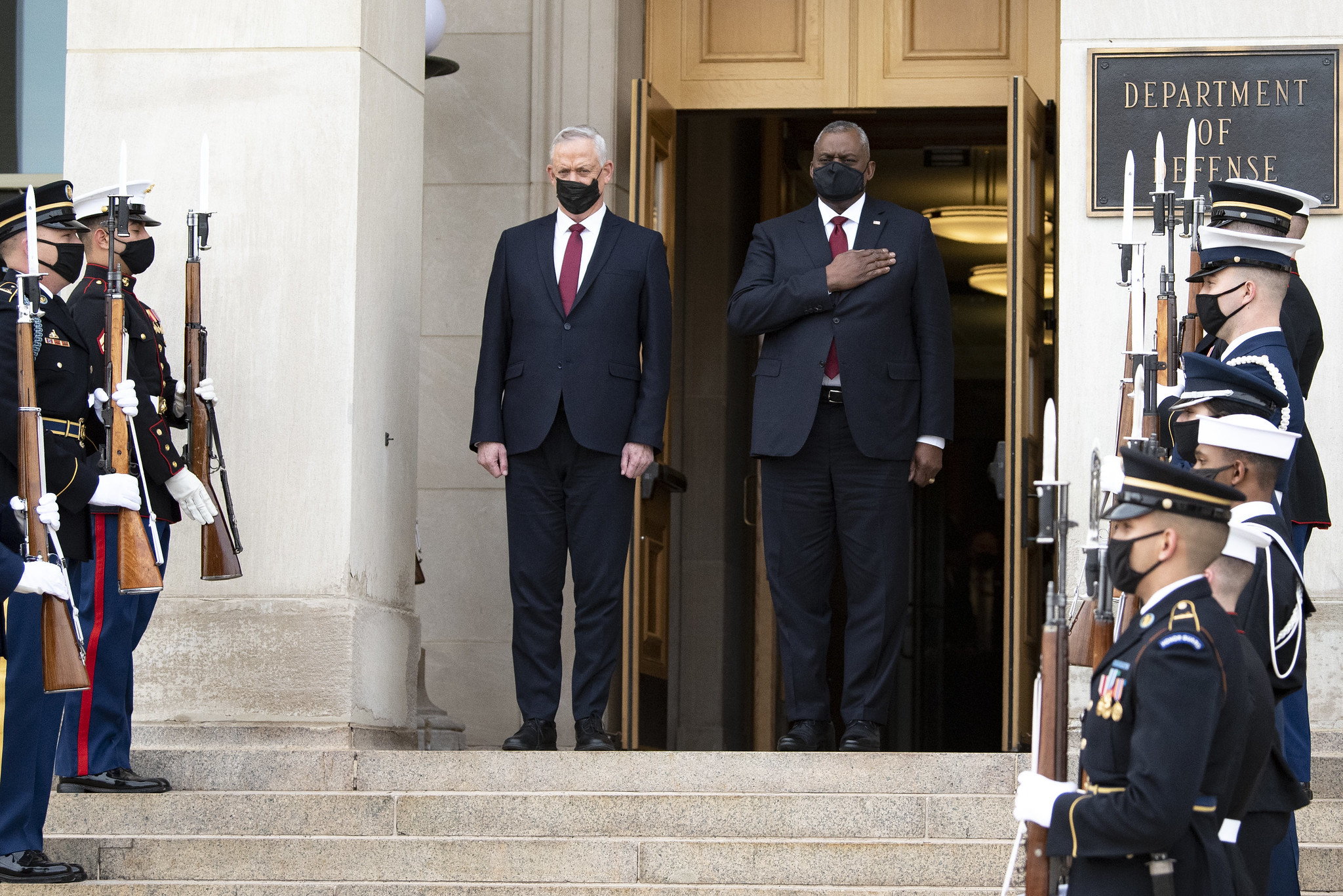
U.S. Secretary of Defense Lloyd Austin, right, hosting Israeli Minister of Defense Benny Gantz at the Pentagon, Dec. 9, 2021. (DoD, Lisa Ferdinando)
Given this devastating toll of human suffering, one might have expected something of a rethink in policy circles about the limits, methods and motives of a decade of failed policy on Syria. The war was accompanied by a loud chorus of cheerleaders driven by a mix of political, professional and humanitarian concerns to lobby for intervention to topple the Iran and Hizbullah-aligned Assad regime.
Think tanks seeking to influence U.S. and British policy — while at the same time in fact reflecting its general tenor, a familiar policy loop — deployed a litany of experts who were heavily present on social and traditional media with an endless stream of soundbites, articles and books. At an early stage when the C.I.A. war was first kicking into gear these analysts were able to drown out saner voices such as that of Syrian rights activist Haytham Manna who opposed the shift from protest to insurrection, foreign intervention and the use of religious sectarianism.
The prime goal of the Gulf Arab and arms industry-backed policy outlets in D.C. was to drag the U.S. government further into the conflict, if not via direct military action then through military and financial support for the various insurgent groups. Beyond selling weaponry, the motivations of funders centered on eliminating regional powers seen by neoconservative ideologues as putting Israeli and Saudi security at risk.
To take some examples of how these writers fed the machine, books such as ISIS: Inside the Army of Terror (2015) and articles such as “How to salvage Syria” (2017) brought together different strands of endless war punditry. Both were coauthored by a pro-Israel neoconservative ideologue who moved on to anti-Russia propaganda during the Trump years and a think tank analyst who consistently provided cover for the sectarian zealotry of the insurgents by claiming they emerged from a traditional well of Syrian “Salafism,” a vague ahistorical term deployed to present a fringe movement as warm and fuzzy.
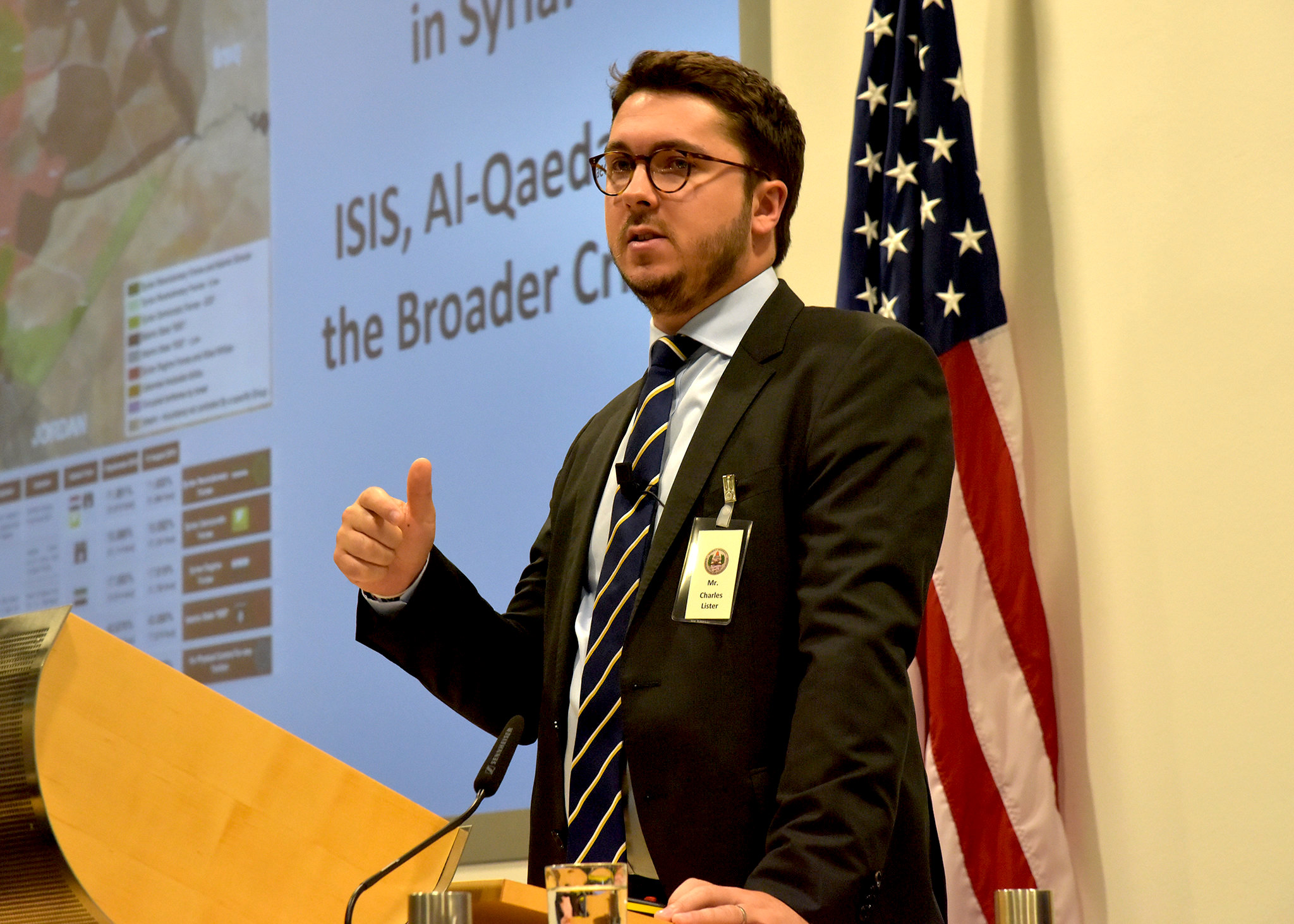
Charles Lister in 2016. (George C. Marshall European Center for Security Studies, Flickr, SSG Amanda Moncada)
Realizing by 2016 that the war was lost, some of the war pundits at institutions such as the Bahrain-funded U.K.-based International Institute for Strategic Studies and Qatar-funded Brookings Institute had moved on to other issues. Others recongregated around a new D.C. think tank called the Newlines Institute (originally the Center for Global Policy), established by Sunni Islamist Ahmed Alwani, founder of the troubled Fairfax University of America.
The shrill lobbying for war of yesteryear has now been replaced by an insistence on sanctions and isolation. Charles Lister — director of the Syria and Counterterrorism and Extremism programs at the Saudi and U.A.E.-funded Middle East Institute — recently rued the emerging U.S. policy of what he called “delegated stabilization,” whereby regional powers are left to pursue their own arrangements with Damascus.
“It is unfortunately true that Assad appears to be here to stay, but that should not result in his neighbors nor the international community at large merely gifting him a free hand,” Lister wrote, in that manner typical for war hawks and ideological hacks of ignoring the plight of ordinary people for a high-stakes and far more sexy game of thrones.
One policy analyst stated bluntly that it wasn’t worth improving the lives of Syrians if it meant shoring up the Assad regime. “The long-term result will be more extremism, refugees and destabilization,” Josh Rogan declared in The Washington Post, projecting in fact the results of a decade of failed regime change. Instead, the United States “should help to improve the lives of Syrians living outside of Assad’s control.”
The Polemical Puzzle

March 27, 2017: Boy at the Zaatari Refugee Camp in Jordan, which houses nearly 80,000 Syrian refugees. (UN Photo/Sahem Rababah)
Introspection it seems is dead. The expertistas who constantly revved up the engines for more war — clean, dirty, overt, covert — got it horribly wrong on Syria. The regime survived. Their expertise proved hollow. Yet they see no cause to reflect on the disastrous policies that perpetuated the bloodshed and their role in crafting and selling them.
In their telling, Syria is a human tragedy in which moral corruption and failed leadership lie incontrovertibly on one side alone, which is the kind of play Shakespeare never wrote. What incompetence was it, that believed managed transition was a viable policy goal alongside a slogan like the State Department gem “Assad must go,” which must rank alongside “I’m with her” as one of the most turgid pieces of political propaganda ever.
That there was no low to which a regime that killed over 20,000 people while pulverizing the city of Hama during a Muslim Brotherhood revolt in 1982 would stoop to survive should have come as a surprise to no one.
Despite this, one of the most egregious and pointless acts of mass carnage in recent times was reduced to a polemical puzzle whereby critics of militarizing, internationalizing and sectarianizing a brave and courageous Arab Spring uprising were smeared as “Assadists” and independent journalists who questioned official narratives branded defenders of genocide.
Framing the conflict in these terms only served to shut down public debate, which was of course the intent. Syria long ago became the foreign policy disaster few outlets, even those on the left, want to talk about — what the late Joan Didion might have called, as she once did in reference to the Palestinian struggle with the Israeli state, “the conservational equivalent of an unclaimed bag on a bus.”
Latterly, Lebanese academic Gilbert Achcar tried to save the reputation of the proxy war project by engaging in the red herring of terminologies — it wasn’t regime change cos no invasion; Russia was the bad imperialist — when the real issue is that constellation A saw a chance to take down a disliked regime and constellation B acted to stop it.
New Politics, which liberally publishes Achcar, is riven with angst that critique of U.S. foreign policy might be seen as apologism for its antagonists, a typical posture in liberal and left media. The fact that even a phone call from Assad to a neighboring head of state should provoke howls of indignation among the Beltway seers is as good an indication as any of the dead-end Syria policy had become.
Now the magic of words seems to be wearing off, and for good or ill the players are moving on to the next act.
Andrew Hammond is a historian at the University of Oxford who writes on modern Islamic thought, political movements and Arabic media. He worked as a Mideast policy analyst with the European Council on Foreign Relations and as a journalist with BBC Arabic and Reuters in Egypt and Saudi Arabia.
The views expressed are solely those of the author and may or may not reflect those of Consortium News.

Of course there’s very much to agree with in this article.
Yet, the magnitude of foreign guilt in the Syrian intervention cannot be properly understood, if it is not clear that foreign actors planned highly provocative actions to overthrow Assad’s government since the beginning.
And that, in this respect, jihadist fighters, with the support of Saudi Arabia and Turkey and the full backing of the West, were channeled to Syria since the very early stages of the so called “civil war”.
Nobody wants to hear this, but it is now abundantly proven that the infamous Ghouta chemical attack of 2013, which closely followed Obama’s “red line” speech regarding the use of such weapons, was carried out by THE OPPOSITION, not the Syrian government, with the obvious goal of triggering a US led invasion, further to Obama’s said stance, to topple Assad:
hXXps://thegrayzone.com/2021/07/26/syrian-insurgents-guilty-of-red-line-2013-sarin-chemical-attack-study-finds/
hXXps://blog.rootclaim.com/new-evidence-2013-sarin-attack-in-ghouta-syria/#
It never made any sense, actually, to assume otherwise, since 1) Assad couldn’t possibly risk a US militarily intervention following the red line speech, that would have overthrown him easily. In 2013, a Russian intervention on his side was also completely out of the question; targeting Ghouta’s civilians didn’t make any sense strategically even. Assad had been fighting jihadist mercenary armies, particularly Al-Qaeda’s affiliate there, the Al-Nusra front, since 2011. Attacking civilians in such a senseless manner would not solve one single problem for his survival, as the armed rebels would still be there to fight, financed awesomely by the Gulf monarchies.
It has become customary to recall that there’s no peace without justice.
Seldom does that reverberate as truth as in the case of Syria.
Odd how people from. European nations call US gov names when almost all the top states financials and politicos profit off of US mainly military actions, loan US billions by buying Treasury bills end up with cheap accss to resources without shedded blood of own.
Sadly no one will pay for all the innocent people killed in this shameful war. not in this life.
“United States” is an oxymoron, goverment is completely disconnected from the citizenry.
This is becoming more apparent by the minute, even to rabid political partisans. Future elections will be wholly rejected by the losing ‘side’. The US military is conducting domestic guerilla warfare drills in preparation for that as well as coming economic collapse. Gotta protect the 0.1% that owns the country.
The endless dead because of the forever-need-for-defense-contractors’ profits…..and the ill-will grows against Western populations that are as skewed as this asinine domino theory backed by the most unethical/criminal element in the US government. Still want a total and open discussion/analysis to reveal by respected journalists the degree the superpowers are ‘playing with human lives as puppets’for arms sales.
Ever since the cowards in office and bankers ripped medium investors/taxpayers off via the 2008 fraud-derivative-game I want blood and this time all those above salary. Time either they are dealt with or taxpayers demand to be front-and-center in gaining shareholder value for taxpayer monies used or requested.
So while US government is accusing Russia about Crimea, pentagon still its illegal occupation on Syria.
The Americans never try anything new and then seem to be surprised that it doesn’t work. Maybe they’re just addicted to creating chaos, as after all it can provide results for them (lack of cohesion in the middle east which continues to allow US and Western pillaging of resources.) I suspect we will see China here soon to clean up the mess and assist with re-establishing infrastructure. Another massive US failure which will benefit their current ‘nemesis’.
The US is at the root of all this evil. Nothing in the UN charter gives any country the power to interfere in the internal affairs of other countries. Furthermore, the US should be held to account for all the color revolutions and other subversions that we have perpetrated around the world (this isn’t to say that the US is the only country to perpetrate such outrages but at this point in history, we’re probably behind 98% of them.) typically using the CIA, the CIA cutout, NED, USAID, and a variety of other “NG”Os.
There is much to agree with in this article. The author makes many important observations on the outside forces involved in the campaign to oust Assad and/or Balkanize Syria. But much of this campaign involved — and still involves — a massive propaganda effort in the West, aimed especially at influencing “liberal” opinion-shapers. An important part of this effort was the “demon-Assad” narrative, portraying the Syrian leader as a vicious sadist torturing tens of thousands to death (the justification for the Caesar Act). Unfortunately, the author seems to buy this narrative, based on both his comments and apparent acceptance of the mainstream sources he cites. He also seems to imply that the 2013 Ghota chemical attack was by the Assad regime, which is almost certainly false.
Syrian security forces were certainly capable of brutality, and there is no need to make Assad out to be a saint. But we should challenge the Establishment narrative at all levels, which includes dissecting the very comprehensive propaganda effort behind the Syrian debacle.
Any mention of the 1982 massacre at Hama should surely state that the commander of that operation, Rifaat al-Assad is not happily ensconced in Damascus but rather lives in France and maintains a property portfolio in England.
What the hell are we doing in these countries anyway except maiming and killing?? We need to GET OUT of them ALL!!!
Agreed but where is the money in it for the Bankers , MIC, and MSM. Americans are too busy watching shows and taking self congrtulatory selfies when they do a token gesture of charity.
As long as Uncle Sam is able to bill you, an American tax paying citizen, to pay for his atrocities in sovereign Islamic lands for the benefit of racist Jewish colonialists, it will continue. Shame or morality have absolutely no bearing on the behavior of your government, which believes that might makes right. Be grateful he does not draft litigation against you, as he has against some demonstrators who thought they had 1st amendment rights. In reality your rights extend only as far as his largess under the new order. It is the “inner party” membership (the ones who financially prop up the professional politicians) that determines government policy, not the “people.” They have no real power. They get hoodwinked every election cycle.